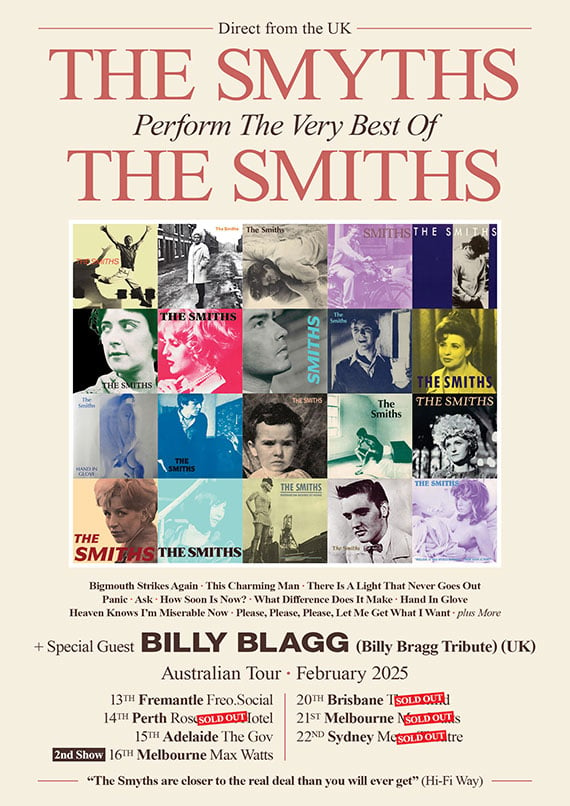
The Smyths
(The Smiths Tribute)
+ Special Guest
Billy Blagg
(Billy Bragg Tribute)
Event Info
A touch of Manchester, with the return of the band noted to be almost better than the real thing THE SMYTHS, performing The Very Best of THE SMITHS. Joined by Special Guest Billy Bragg Tribute, BILLY BLAGG
There’s cover bands, there’s tribute bands, then there’s THE SMYTHS. With over 1000 shows, THE SMYTHS have been retelling classic moments from The Smiths songbook. THE SMYTHS do more than copy and paste. Close your eyes, and you won’t know the difference…
The Very Best of The Smiths Setlist will include – Bigmouth Strikes Again, This Charming Man, Panic, How Soon Is Now?, Hand in Glove, What Difference Does It Make, There is a Light that Never Goes Out, Please Please Please Let Me Get What I Want, Girlfriend in a Coma plus Many More! Billy Blagg’s Billy Bragg Tribute Setlist will include – A New England, Greetings to the New Brunette, Levi Stubb’s Tears, Sexuality, Waiting for the Great Leap Forwards plus More!
Having stunned and impressed some of the most devoted fans of The Smiths, The Smyths make their triumphant return to Australia and New Zealand this coming February. Grab your tickets now!
The Smyths Setlist –
Barbarism Begins At Home
Bigmouth Strikes Again
Girlfriend In A Coma
Hand In Glove
How Soon Is Now?
I Started Something I Couldn’t Finish
Irish Blood English Heart
Last Night I Dreamt That Somebody Loved Me
Please, Please, Please, Let Me Get What I Want
Shakespeare’s Sister
Sheila Take A Bow
Shoplifters of the World Unite
Stop Me If You Think You’ve Heard This One Before
Suedehead
That Joke Isn’t Funny Anymore
The Boy With The Thorn In His Side
The Last Of The Famous International Playboys
The Queen Is Dead
There Is A Light That Never Goes Out
This Charming Man
What Difference Does It Make?
William, It Was Really Nothing
Billy Blagg Setlist –
A New England
Between The Wars
Greetings to the New Brunette
Levi Stubb’s Tears
Sexuality
The Milkman of Human Kindness
The Saturday Boy
The World Turned Upside Down
There is Power in a Union
To Have and to Have Not
Waiting for the Great Leap Forwards


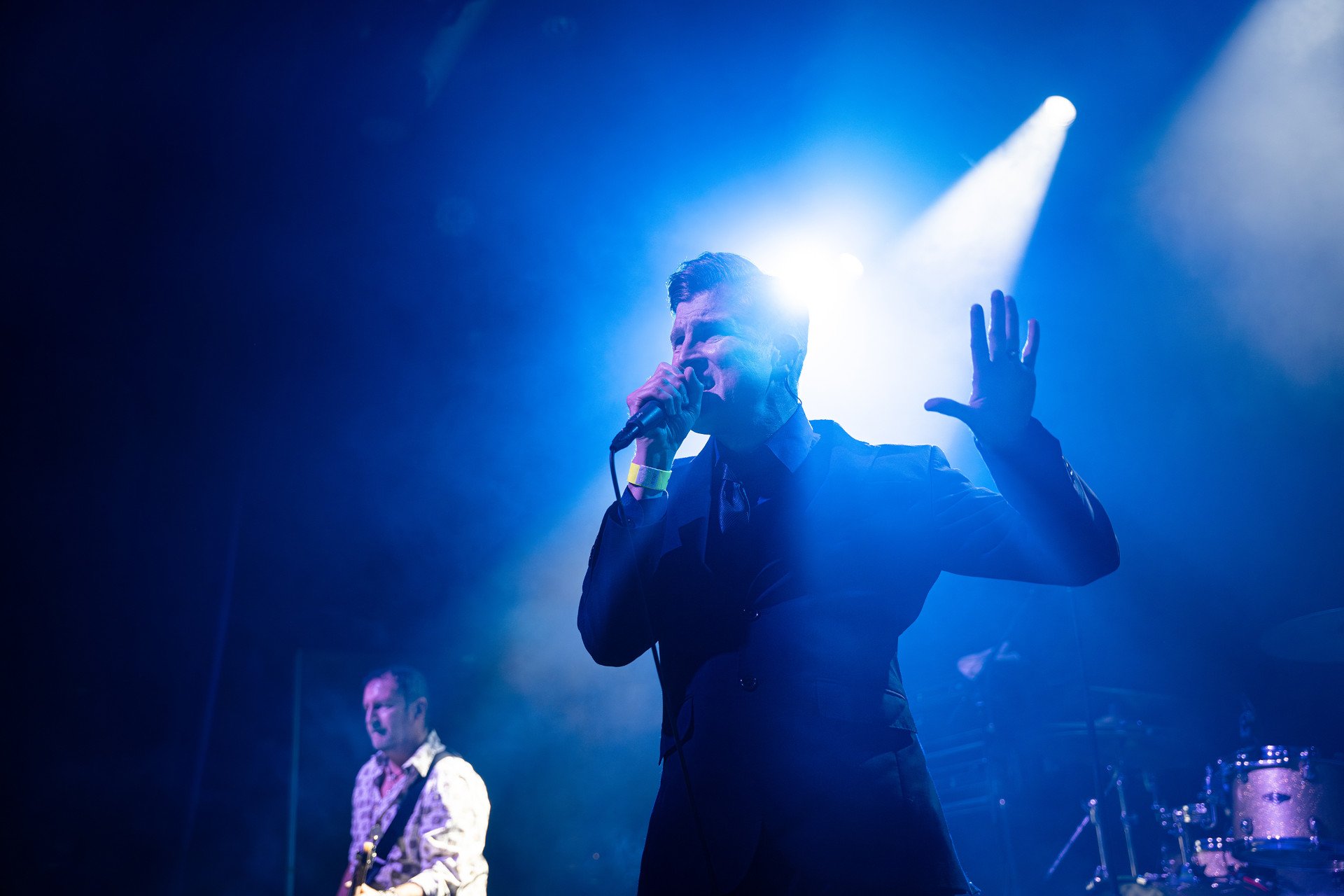
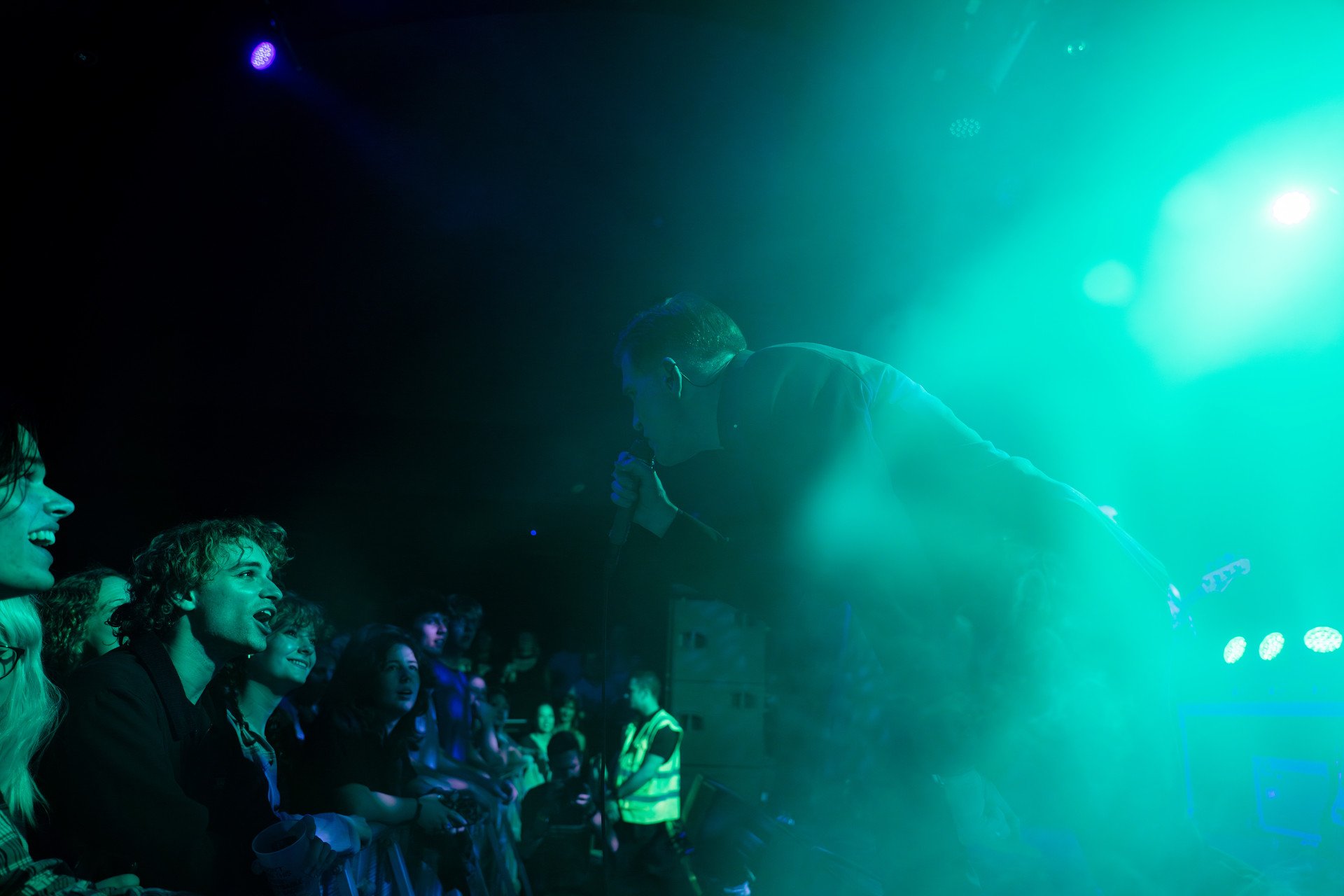



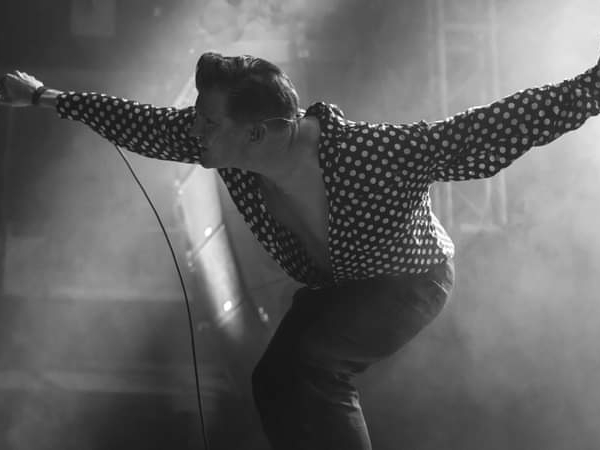

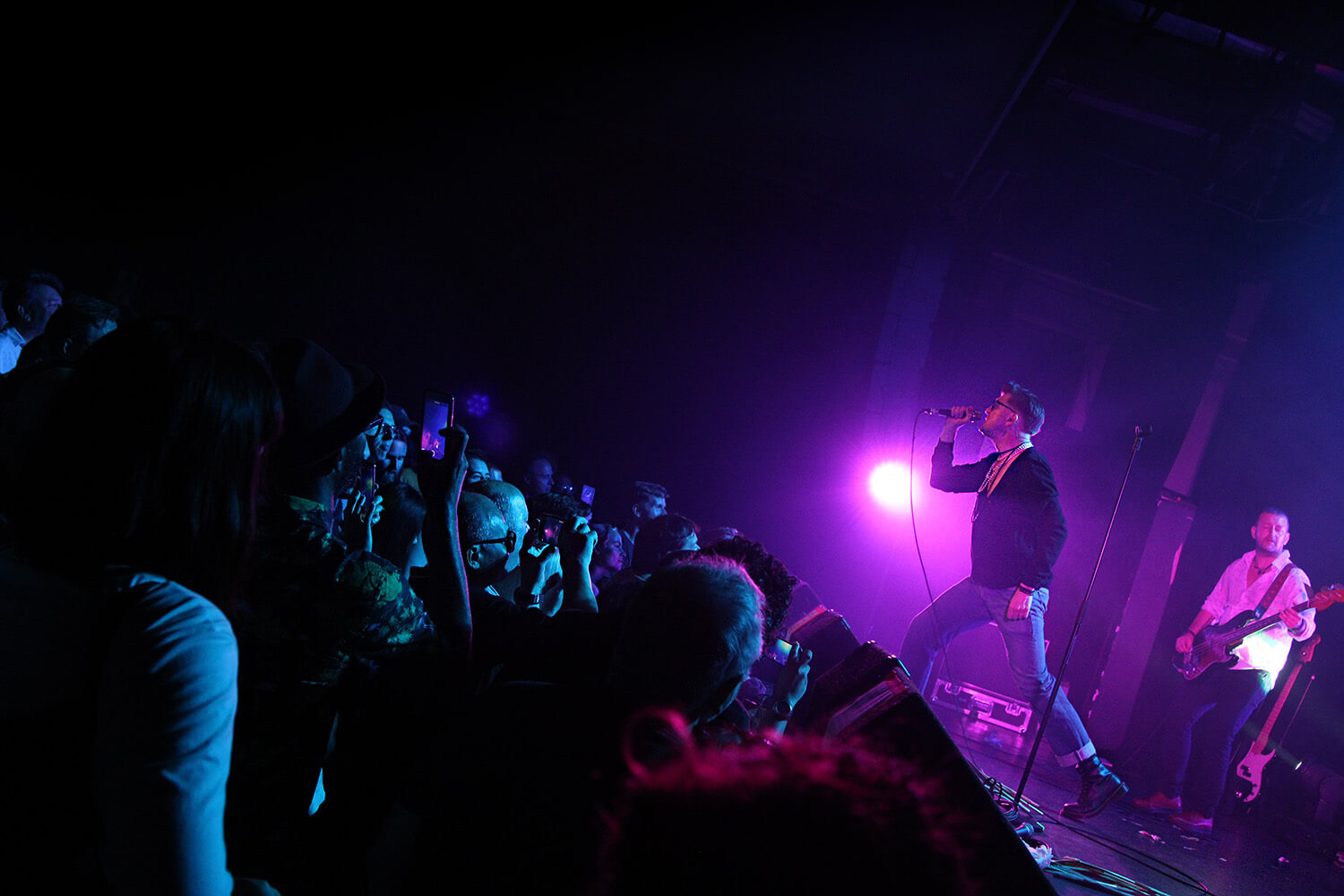
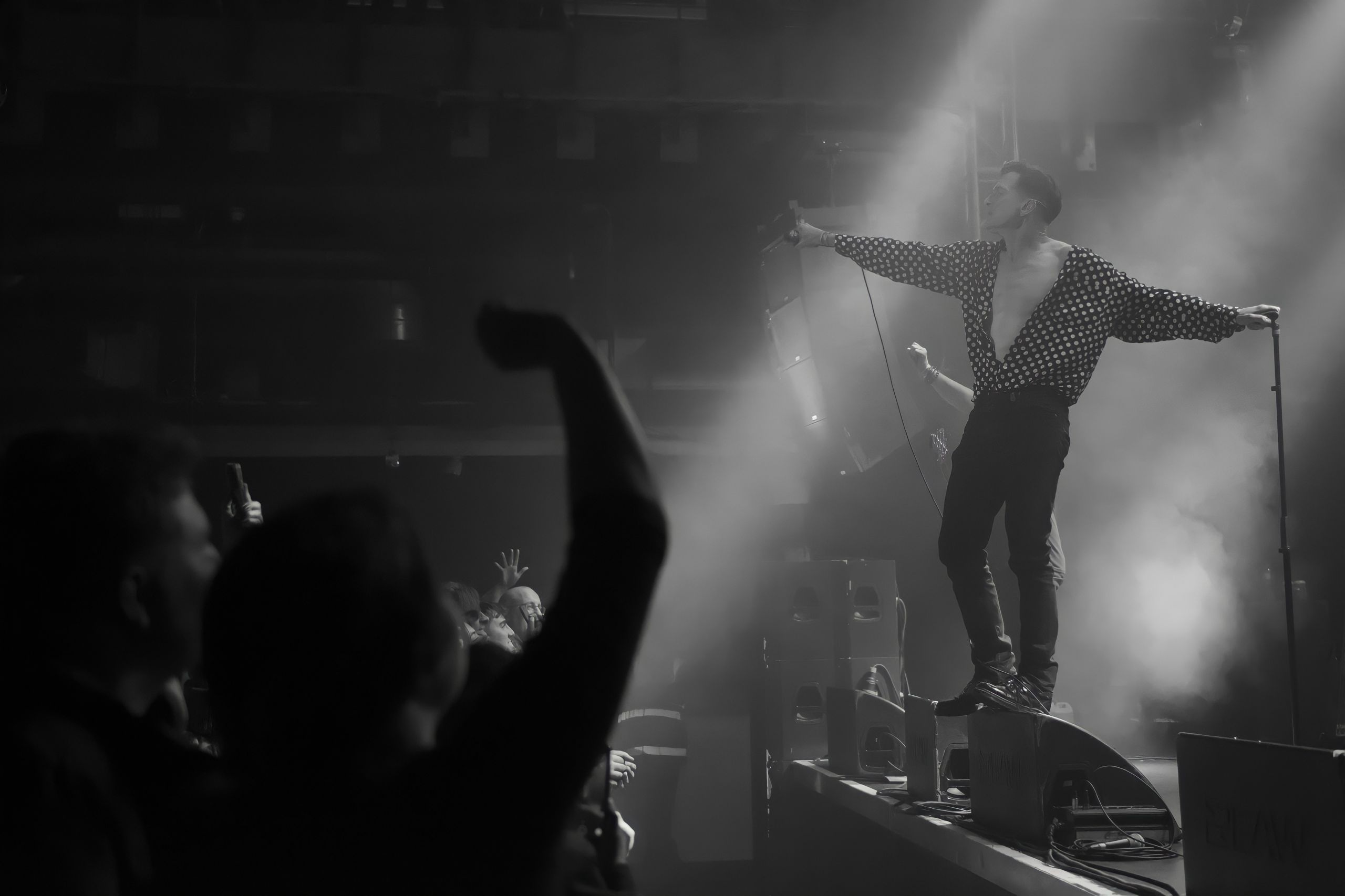
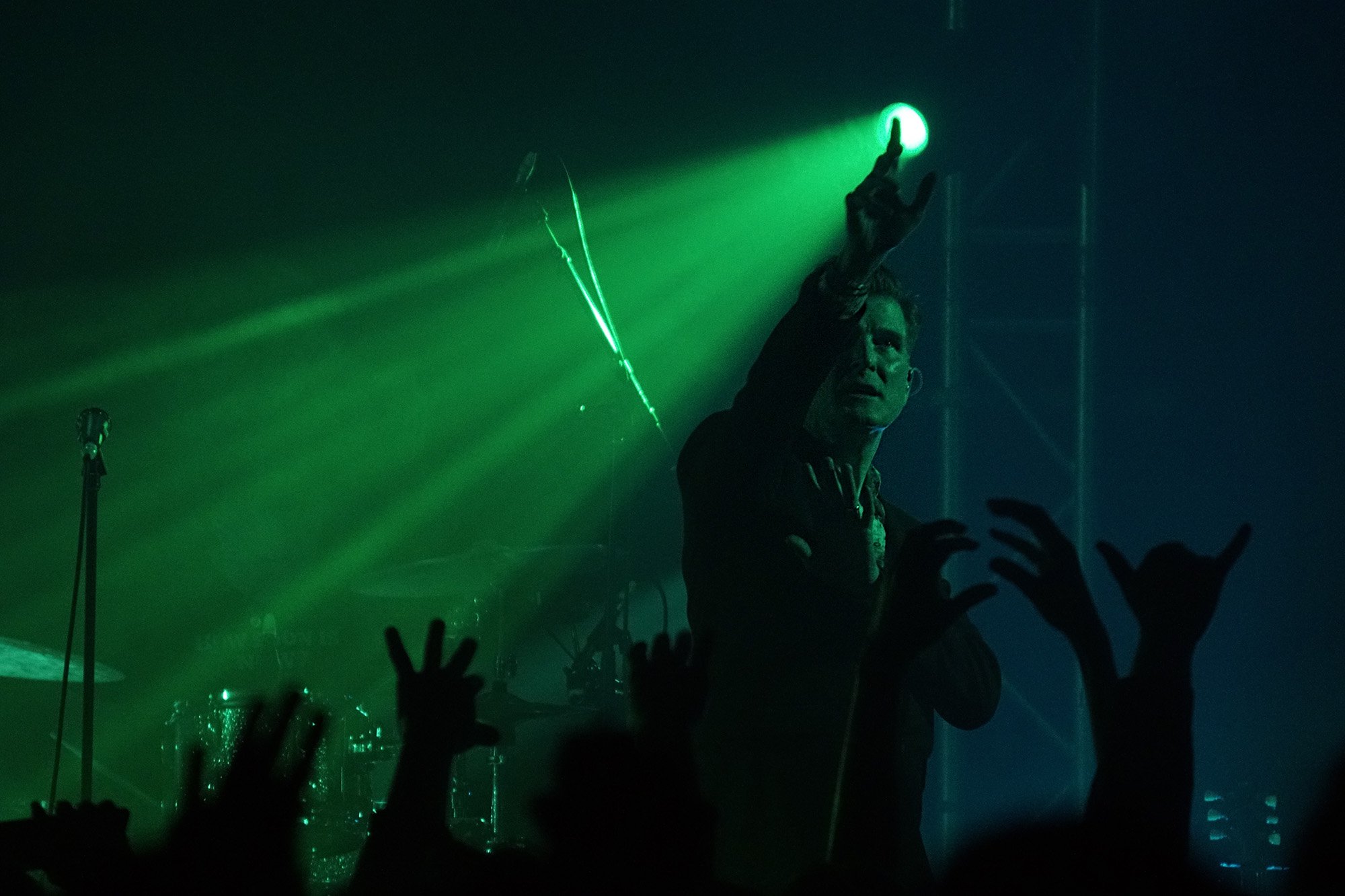
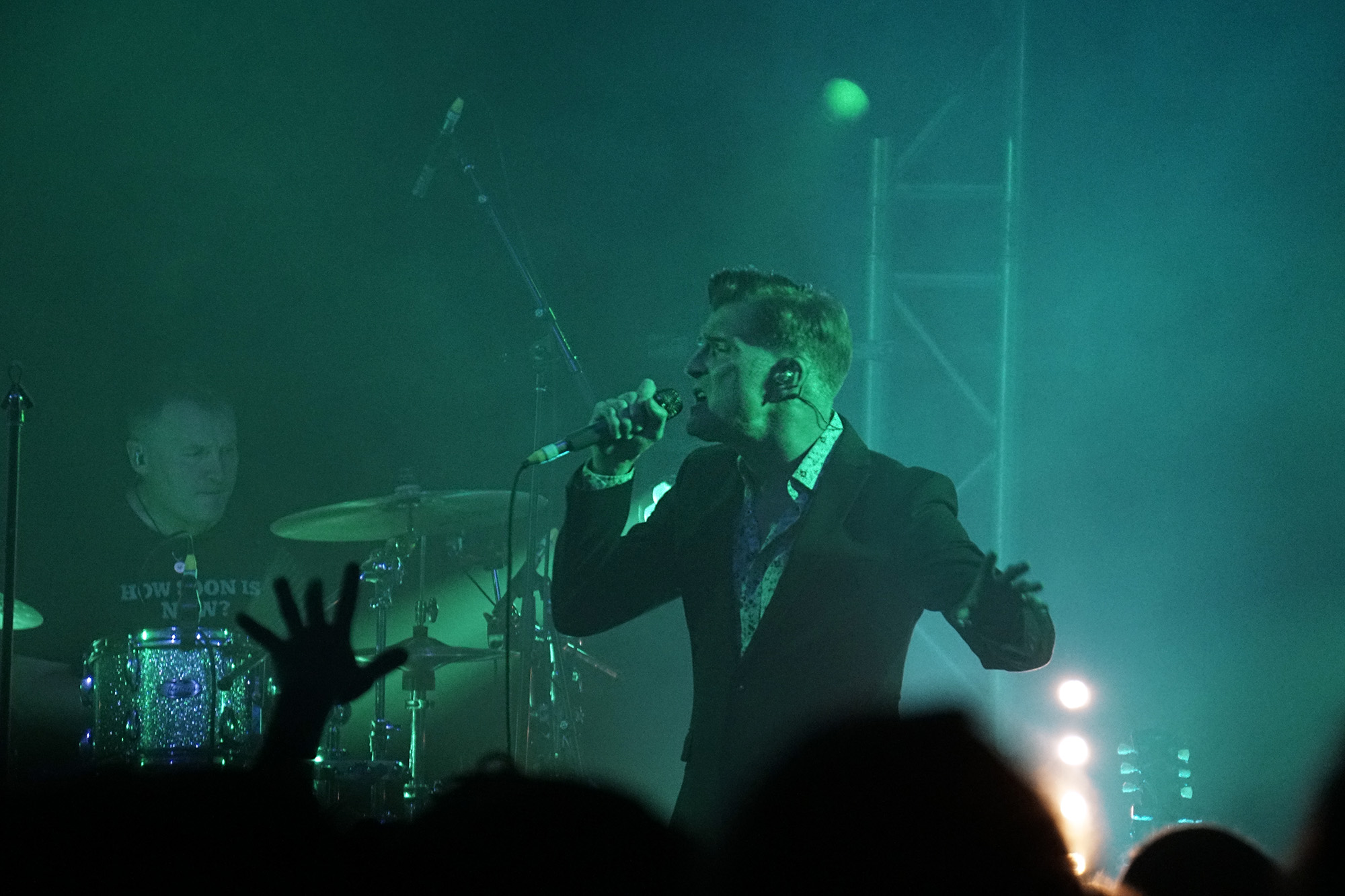
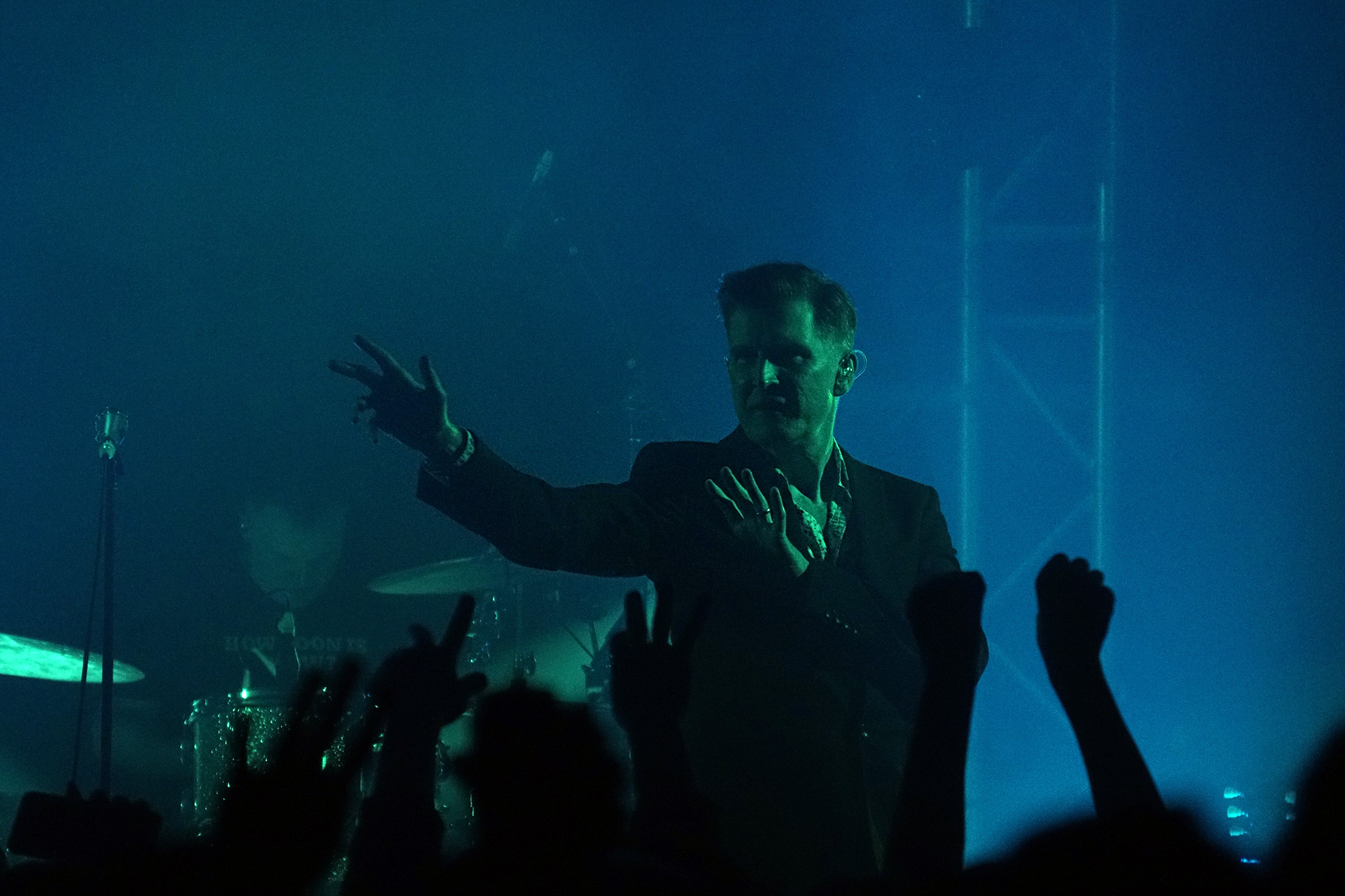
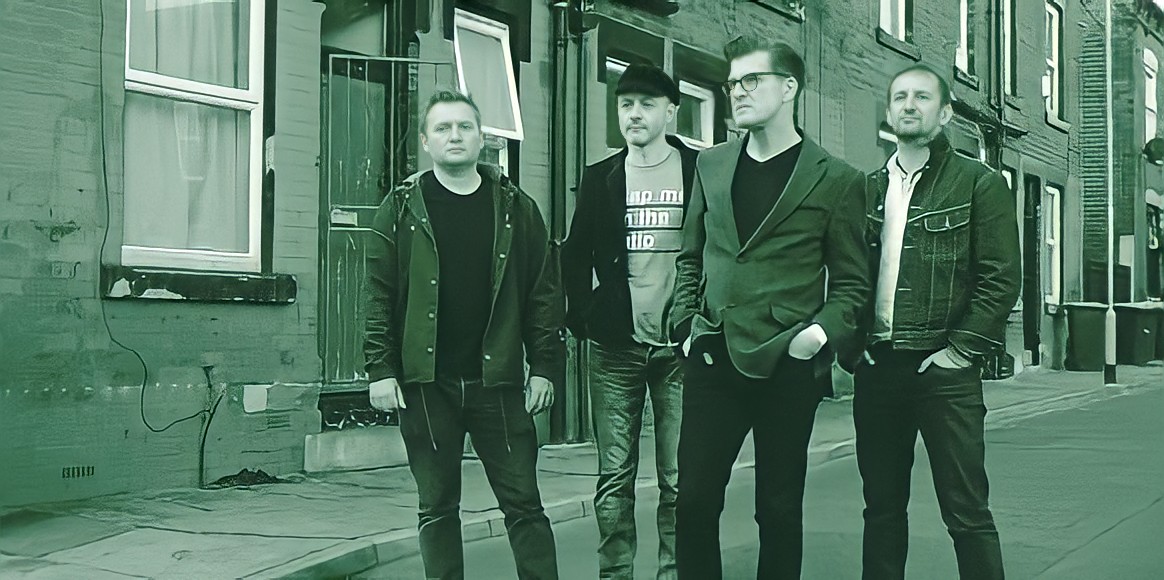



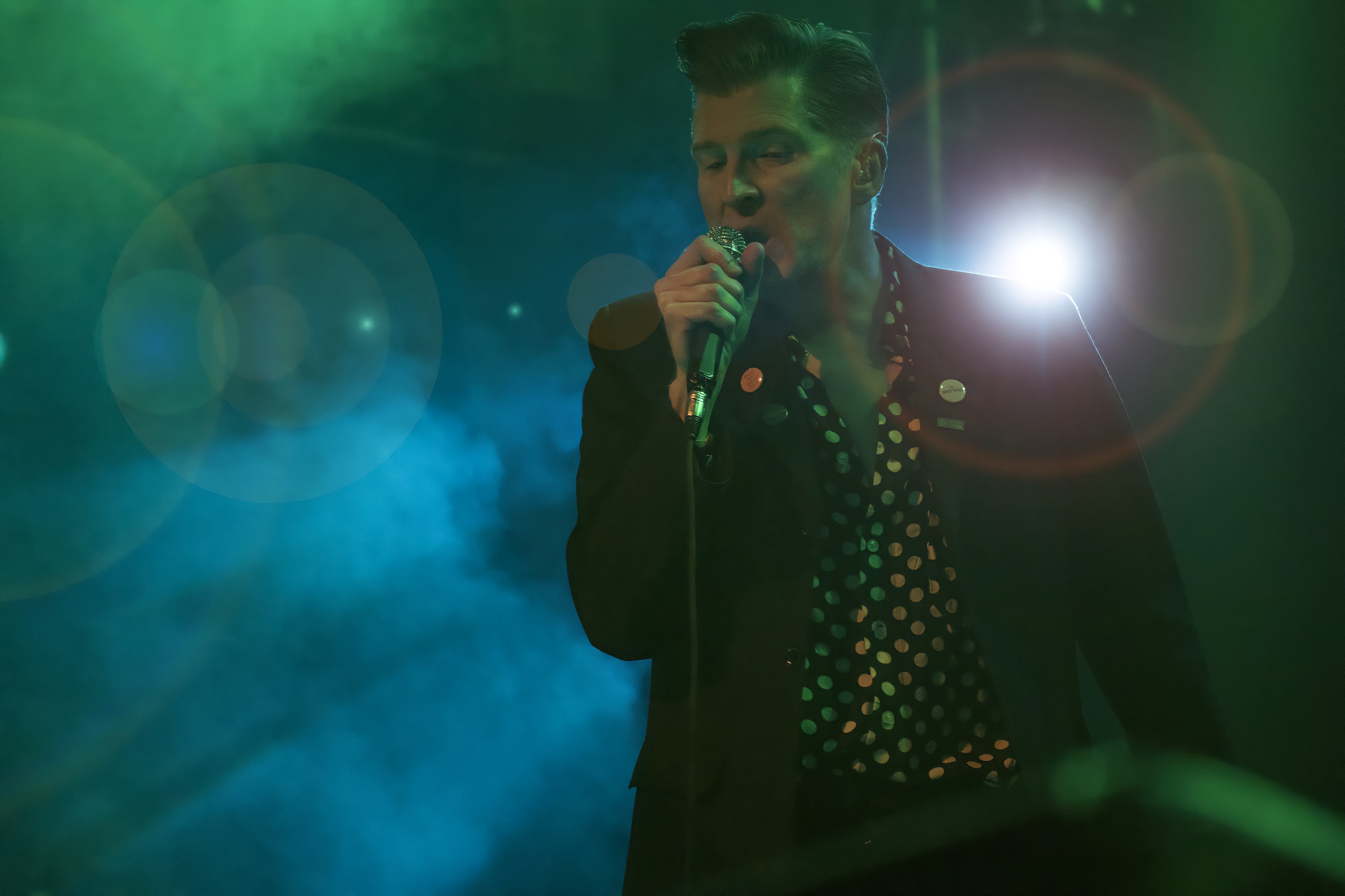
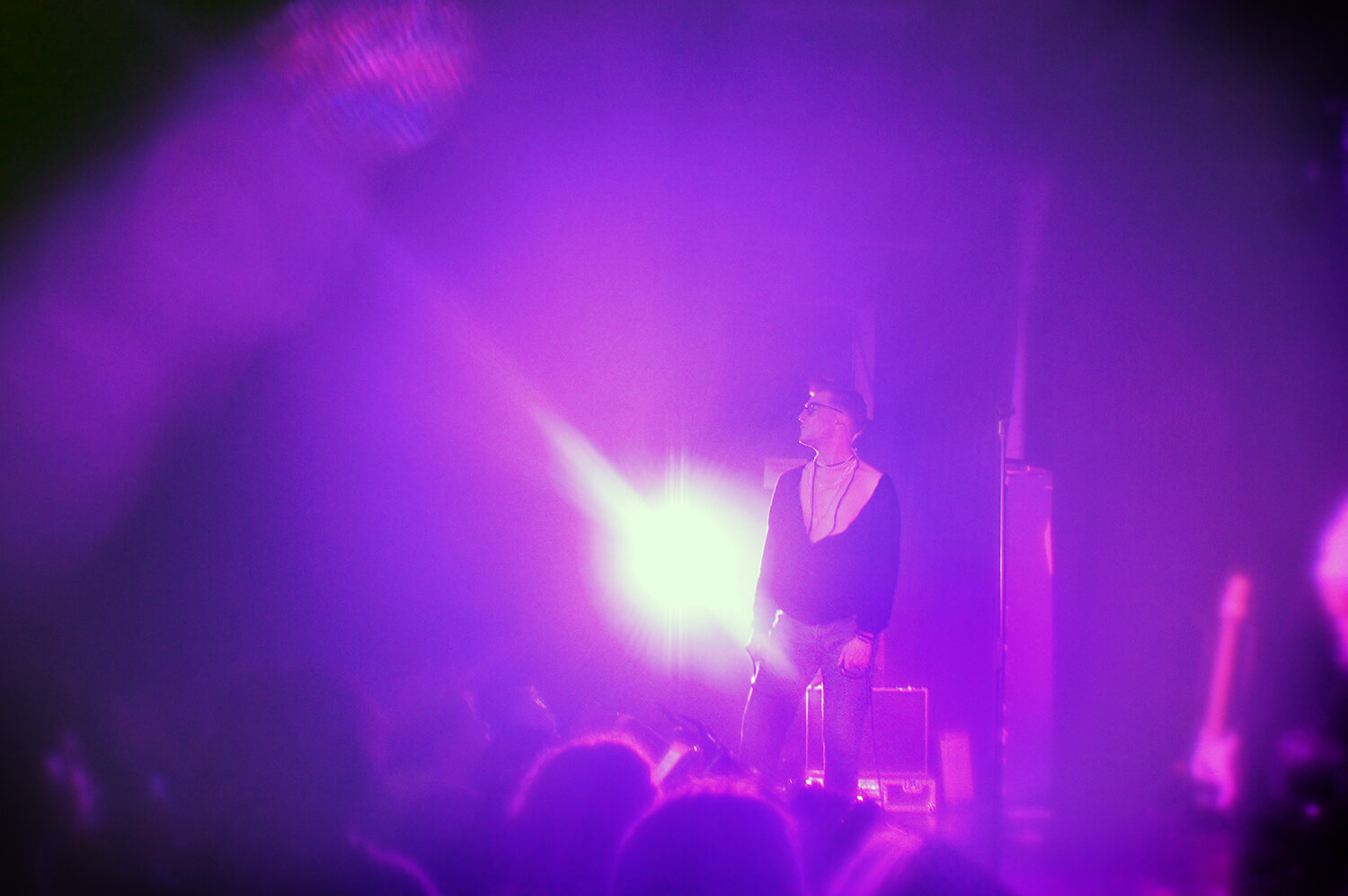
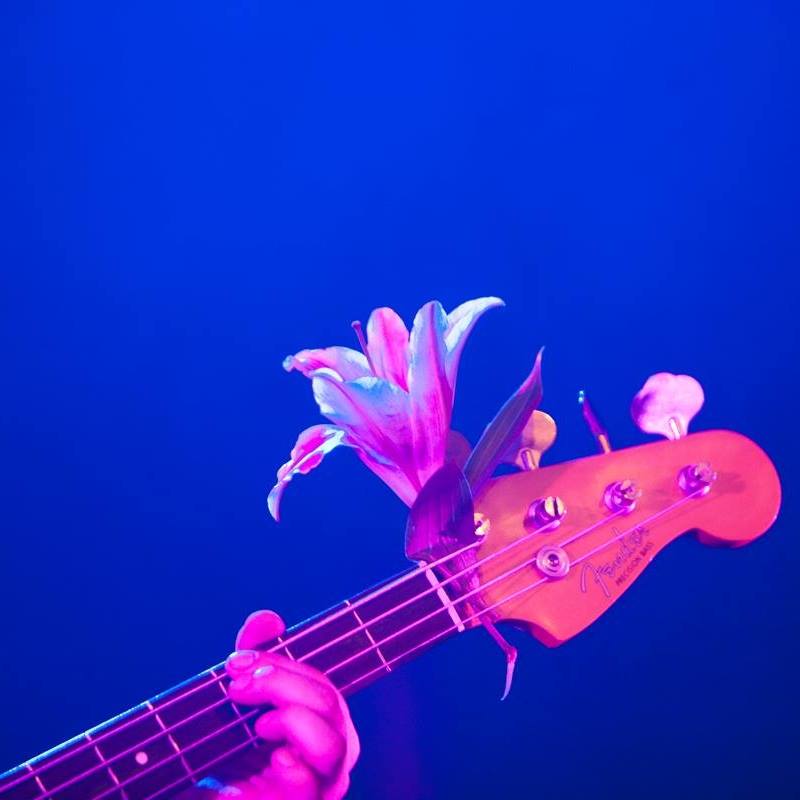

THE SMYTHS bring the sound, feel and ultimately, the spirit of THE SMITHS…
The Smiths were one of the most popular and acclaimed bands of all time. The Smiths are described by allmusic.com as “the definitive British indie rock band of the ’80’s” and although they only existed for five years and broke up 33 years ago, their relevance and influence has only grown. The Smiths defined disillusioned youth in the shadows of Margret Thatcher’s Britain and explored universal emotions and still relevant political attitudes and ideas that have allowed their music an appeal that spans generations. Ian Youngs of BBC News described them as “the band that inspired deeper devotion than any British group since the Beatles”.
Despite being signed to the independent label Rough Trade Records for the majority of their career, The Smiths had significant mainstream success. The Smiths had several singles in the Top 20 of the UK Singles Chart and all of their studio albums reached the top five of the UK Albums Chart, including Meat is Murder which reached number one in 1985. In addition to their success in the UK, their subsequent albums, The Queen is Dead and Strangeways, Here We Come and live album Rank all charted in the top 10 on the European albums chart and the top 100 on the Billboard charts in the USA. In 2012, all four of the Smiths’ studio albums appeared on Rolling Stone’s list of the “500 Greatest Albums of All Time” and “William, It Was Really Nothing” and “How Soon Is Now?” Were included in the “500 Greatest Songs of All Time” list. The Queen is Dead was once proclaimed as the greatest album ever by NME.
The crux of the Smiths was the musical collaboration between Steven Morrissey and Johnny Marr. Marr and Morrissey were first introduced to each other by mutual acquaintances Billy Duffy and Howard Bates at a Patti Smith gig at the Apollo Theatre in Manchester in 1978. Morrissey was inspired by glam rock acts like David Bowie, Roxy Music, T. rex, Sparks and the New York Dolls. He even started a British fan club for the New York Dolls and would go on to write a 24 page booklet about the Dolls, which would later play a pivotal role in the formation of the Smiths. After seeing the Sex Pistols at Lesser Free Trade Hall in 1976, Morrissey began mixing with the Manchester punk scene, fronting Billy Duffy’s group, The Nosebleeds and then the band, Slaughter and the Dogs. Marr had been performing in bands since he was 13. His first band, Paris Valentinos, also featured future Smiths bassist, Andy Rourke and played Thin Lizzy and Rolling Stones covers.
In 1979 Marr reunited with Rourke and formed the band White Dice. White Dice entered a demo-tape competition organised by NME, which they won and their prize was an audition with F-Beat Records. F-Beat Records did not opt to sign White Dice, the band continued for a couple of years but ultimately didn’t go anywhere. When White Dice dissolved, Marr formed a funk band called Freak Party which quickly fizzled out. In 1982, Marr wanted to establish a new band with a more serious intent. Impressed by Morrissey’s book on the New York Dolls, Marr figured Morrissey would be the ideal frontman for this new band. As the story goes, Marr simply showed up on the doorstep of Morrissey’s house to ask him about starting a band – the act was inspired by the legendary Elvis Presley songwriting team of Jerry Leiber and Mike Stoller which formed after the former showed up on the latter’s doorstep. According to Morrissey: “We got on absolutely famously. We were very similar in drive.”
On the original shortlist of names for the new group were Smiths Family and Smithdom before finally settling on the Smiths. Morrissey would later comment on the name, “it was the most ordinary name and I thought it was time that the ordinary folk of the world showed their faces”. Morrissey and Marr recorded a demo of three songs, “The Hand That Rocks The Cradle”, “Suffer Little Children” and a cover of “I Want a Boy for My Birthday” by the American girl group, The Cookies. Marr was not familiar with the original but loved the idea of subverting traditional British values having a man sing the song. The band were initially joined by bassist Dale Hibbert and drummer Simon Wolstencroft, but Woldstencroft was not interested in joining the band full time and so the band auditioned Mike Joyce, who the group quickly welcomed.
In October 1982, the Smiths made their debut at the Ritz in Machester opening for Blue Rondo à la Turk. The band came onstage to Klaus Nomi’s version of Henry Purcell’s “The Cold Song” playing through the venue’s sound system before Morrissey’s friend and dancer, James Maker stepped onstage to introduce the band, in French. Maker remained onstage dancing through The Smiths’ performance, later reflecting, “I was given a pair of maracas – an optional extra – and carte blanche. There were no instructions… I was there to drink red wine, make extraneous hand gestures and keep well within the tight, chalked circle that Morrissey had drawn around me.” The show did not go particularly well. Marr & Morrissey were unhappy with Hibbert’s performance and his lack of commitment to their ideas for the image of the band. Dale Hibbert was growing uncomfortable with what he perceived to be the group’s “gay aesthetic”. Hibbert would later comment in the documentary, These Things Take Time, “there was an image being nurtured and I was a bit of an odd one out… it didn’t fit in with the fact I was married with kids…” Hibbert was fired after their first show and Marr recruited his childhood friend and White Dice bandmate, Andy Rourke.
With a now permanent line up in place, The Smiths recorded their second demo tape which contained the songs “What Difference Does It Make?”, “Handsome Devil”, and “Miserable Lie”, the band performed their second show in January 1983, this would mark James Maker’s final appearance as a dancer with the band. The band’s demo tape was rejected by major record company, EMI but piqued the interest of Geoff Travis from the independent record label, Rough Trade Records. Travis was not initially committed to sign the band to a full record contract, but did agree to record and release their song “Hand In Glove” as a single. Morrissey picked the cover image of the single. A homoerotic photograph by Jim French which he found in Margaret Walters’ The Nude Male. The single was released in 1983 and while not a Top 40 hit, it would sell consistently over the next 18 months. The single also coincided with the band’s second performance in London at the University of London Union. This performance led to the band being invited to perform on John Peel’s legendary and incredibly influential BBC Radio 1 show. John Peel would later say of the Smiths, ”I was impressed because unlike most bands… you couldn’t immediately tell what records they’d been listening to. That’s fairly unusual, very rare indeed…” Andy Rourke reflected about the importance of the Peel sessions for the Smiths, “John Peel… picked up on it early on… and promoted us really well.” – with Peel’s ringing endorsement of the band, the group began to get coverage in NME and Sounds magazines which convinced Rough Trade to sign the band to a more long term contract.
Rough Trade brought in Troy Tate of the Teardrop Explodes to produce the Smiths’ debut album, originally titled, The Hand That Rocks the Cradle. The group recorded at the Elephant Studios in Wapping, East London but Rough Trade were unhappy with the album and Troy’s production, ordering the band to redo it with a new producer, John Porter. In the lead up to the eventual release of the band’s debut, Rough Trade issued two singles. First “This Charming Man”, a moderate success on release, peaked at number 25 in the charts. The single was reissued in 1992 where it reached number 8, making it the Smiths’ highest charting single. The second single Rough Trade released was “What Difference Does It Make?” which reached number 12 on the charts. These singles along with repeated appearances on the Peel show, the David Jensen radio show and televised appearances on The Tube and Top of the Pops helped The Smiths cultivate a die hard fanbase.
The Smiths’ self titled debut album was released in February of 1984. It reached number two on the UK albums chart and continued to chart for 33 consecutive weeks. The cover of the album was designed by Morrissey, a cropped still from Andy Warhol’s 1968 film Flesh, featuring American actor Joe Dallesandro. In addition to singles “Hand in Glove”, “This Charming Man” and “What Difference Does It Make?” The album also contained the debut of “Suffer Little Children” and fan favourite “Still Ill”, which continues to be a staple of both Morrissey and Johnny Marr’s solo setlist. A 2007 documentary about the Smiths was titled The Smiths: Still Ill. Songs on the album such as “Reel Around the Fountain” and “The Hand That Rocks The Cradle” caused controversy at the time. For many the release of The Smiths’ debut album marked the end of new wave and new romantic pop music in the UK.
The Smiths followed up their debut album with a series of non-album track singles. The first of which was “Heaven Knows I’m Miserable Now”, which reached number 10 on the carts. Driven largely by controversy around the b-side “Suffer Little children” which was about the notorious Moors Murders. This was followed with “William, It Was Really Nothing” which peaked at number 17. One of the b-sides to the single was “How Soon Is Now?”, which would be released as a single on it’s own in 1985 where it would reach number 24 on the singles charts. Johnny Marr would say of the song in 2007 , “How Soon Is Now?” is “possibly [the Smiths‘] most enduring record. It’s most people’s favourite, I think.” The Smiths closed out 1984 with the release of Hatful of Hollow, a compilation of the band’s previously released singles, b-sides and a selection of the band’s performances from the John Peel Sessions and David Jensen show. Hatful of Hollow would reach number 7 on the UK albums chart where it remained for 46 weeks. In 2000, Q Magazine listed Hatful of Hollow at 44 on a list of the “100 Greatest British Albums Ever”.
Not ones to rest on their success, the Smiths issued their second full length album in February of 1985. The substantially more politically charged Meat is Murder. Meat is Murder debuted at number 1 on the UK albums chart. Although reviews for the album were not as strong as for the debut, Morrissey found himself frequently in the middle of controversy for his strident and often contrary views. He publicly condemned the Thatcher administration and was extremely vocal about promoting vegetarianism, even forbidding the other Smiths band members to eat meat in public, although they remained largely carnivorous omnivores. The Meat is Murder songs “The Headmaster Ritual” and “Barbarism Begins at Home” lashed out at the use of corporal punishment to raise children both at home and in schools. Morrissey caused more controversy when he mocked the famine relief project Band Aid with the dour quip “One can have great concern for the people of Ethiopia, but it’s another thing to inflict daily torture on the people of England.” The band immediately followed Meat is Murder up with the non album single, “Shakespeare’s Sister”, which reached 26 in the Single chart. The only song pulled from Meat is Murder for a single release was “That Joke Isn’t Funny Anymore”, which failed to reach the top 40 in the Singles charts and was released at the insistence of Morrissey and against Rough Trade’s wishes. Marr has cited the song as one of his favourite Smiths songs.
The band’s third and penultimate studio album, The Queen Is Dead was released in June of 1986. A dispute with Rough Trade records had delayed the album’s release by nearly seven months. The album had been preceded by the single release “The Boy with the Thorn in His Side” which had come out in September of 85. In 2003, Morrissey called it his favourite Smiths song. The track details the band’s issues with the music industry, the thorn in their side. “Bigmouth Strikes Again” was released as a single in May, which hit number 26 in the Singles charts. With the two singles having served as an appetiser and the relatively long gap between studio recordings, The Queen Is Dead peaked at number 2 in the UK charts and was released in the USA by Sire Records, where the album reached number 70, the band’s first chart success in the USA. The album included fan favourites like “Frankly, Mr Shankly”, “Cemetary Gates”, “Vicar in a Tutu” and “There Is a Light That Never Goes Out”, the latter of which would be released as a single in 1992 after the band had broken up. The Queen Is Dead was praised for remarkable diversity in musical styles and emotional moods. Widely considered one of the best albums of the 1980s, The Queen Is Dead has had a remarkable longevity that consistently sees the album appearing on “greatest albums lists” to this day. In 2013, The Queen Is Dead was ranked the greatest record of all time on the NME’s “Greatest Albums of All Time” list. Despite the band’s commercial, critical and creative triumphs, all was not well within the band.
The pressures of constant touring and music industry disputes were taking a toll on the band. Johnny Marr had turned to alcohol to help him cope, later telling NME that “‘worse for wear’ wasn’t the half of it. I was extremely ill. By the time the tour actually finished it was all getting a little bit … dangerous. I was just drinking more than I could handle.” Andy Rourke had turned to heroin, which saw him temporarily kicked out of the band. Rourke was replaced by Craig Gannon of the band Aztec Camera. Rourke was quickly reinstated into the band and Gannon moved to rhythm guitar. This five piece line up recorded the non-album singles “Panic” and “Ask” which reached number 11 and 14 on the UK singles chart. “Panic” received some controversy due to it’s repeated lyrical refrain of “Burn down the disco… hang the DJ”.
The Smiths’ North American tour of 1986 was a low point for the band, despite strong ticket sales, the group were being ravaged internally as the band and crew indulged in heavy drinking and drug use (with the notable exception of Morrissey). Fed up with their management and long standing issues with Rough Trade, Marr and Morrissey decided to cancel the last four shows of the American tour, which was to included a final date at New York City’s famous Radio City Music Hall. The group returned to England where they almost suffered a fatality when Johnny Marr was involved in a car crash. While he recovered, guitarist Craig Gannon was fired, having only played on 6 studio tracks. The band ended the year with a concert at the Brixton Academy supported by fellow Mancunians, the Fall. It would prove their final UK appearance.
While the internal struggles of the Smiths are known now, at the time, the press and public still adored the band. In early 1987, the single “Shoplifters of the World Unite” was released. This was followed with a second compilation of singles and b-sides, The World Won’t Listen. The World Won’t Listen stayed in the top 100 albums chart for 15 weeks, peaking at number 2. Ironically a sizeable enough population were listening, though maybe not the entire world! The band continued their success with the release of the glam rock inspired, “Sheila Take A Bow”, which reached number 10 on the UK Singles chart. The joint highest charting single the band would experience while still an active band. Despite this continued success frictions in the band led to Johnny Marr taking a hiatus from the band in June, he would officially quit the Smiths in July following a NME article called “Smiths to Split” which he erroneously believed was planted by Morrissey. Allegedly Marr believed Morrissey was jealous of Marr working with other artists such as Bryan Ferry and Billy Bragg. Additionally Marr was tired of Morrissey’s obsession with 60’s pop and refusal to try new ideas, Marr would later comment in 1992, “I didn’t form a group to perform Cilla Black songs.” While the band had already broken down, they released their fourth and final studio album, “Strangeways, Here We Come” posthumously in 1987. It also peaked at number two in the UK and at number 55 in the US. Both Morrissey and Marr cite it as their favourite Smiths album. Stephen Thomas Erlewine of allmusic.com in his review summarises the album as “… a graceful way to bow out. While it doesn’t match The Queen Is Dead or The Smiths, it is far from embarrassing and offers a summation of the group’s considerable strengths.
Any chance of a Smiths reunion officially came to an end when Joyce and Rourke sued Morrissey and Marr in 1991, claiming they received only ten percent each of the group’s earnings while the songwriters received 40 percent each. Rourke eventually settled out of court, but Joyce won his case in late 1996. Morrissey would later comment on the law suit saying “The court case was a potted history of the life of the Smiths. Mike, talking constantly and saying nothing. Andy, unable to remember his own name. Johnny, trying to please everyone and consequently pleasing no one. And Morrissey under the scorching spotlight in the dock being drilled. “How dare you be successful?” “How dare you move on?” To me, the Smiths were a beautiful thing and Johnny left it, and Mike has destroyed it.” Despite reportedly huge money offers for the band to reform, the group has remained disbanded for over 33 years.

